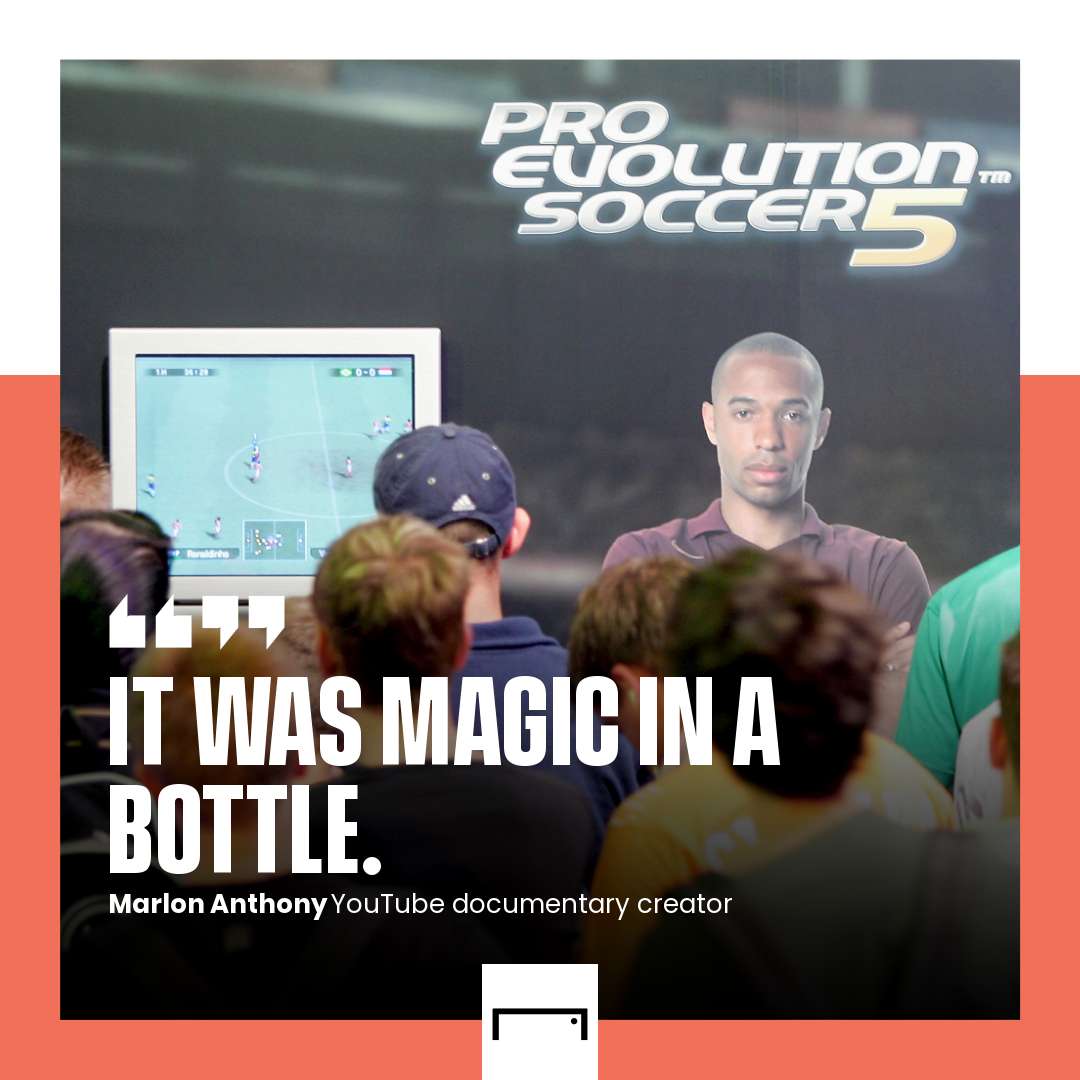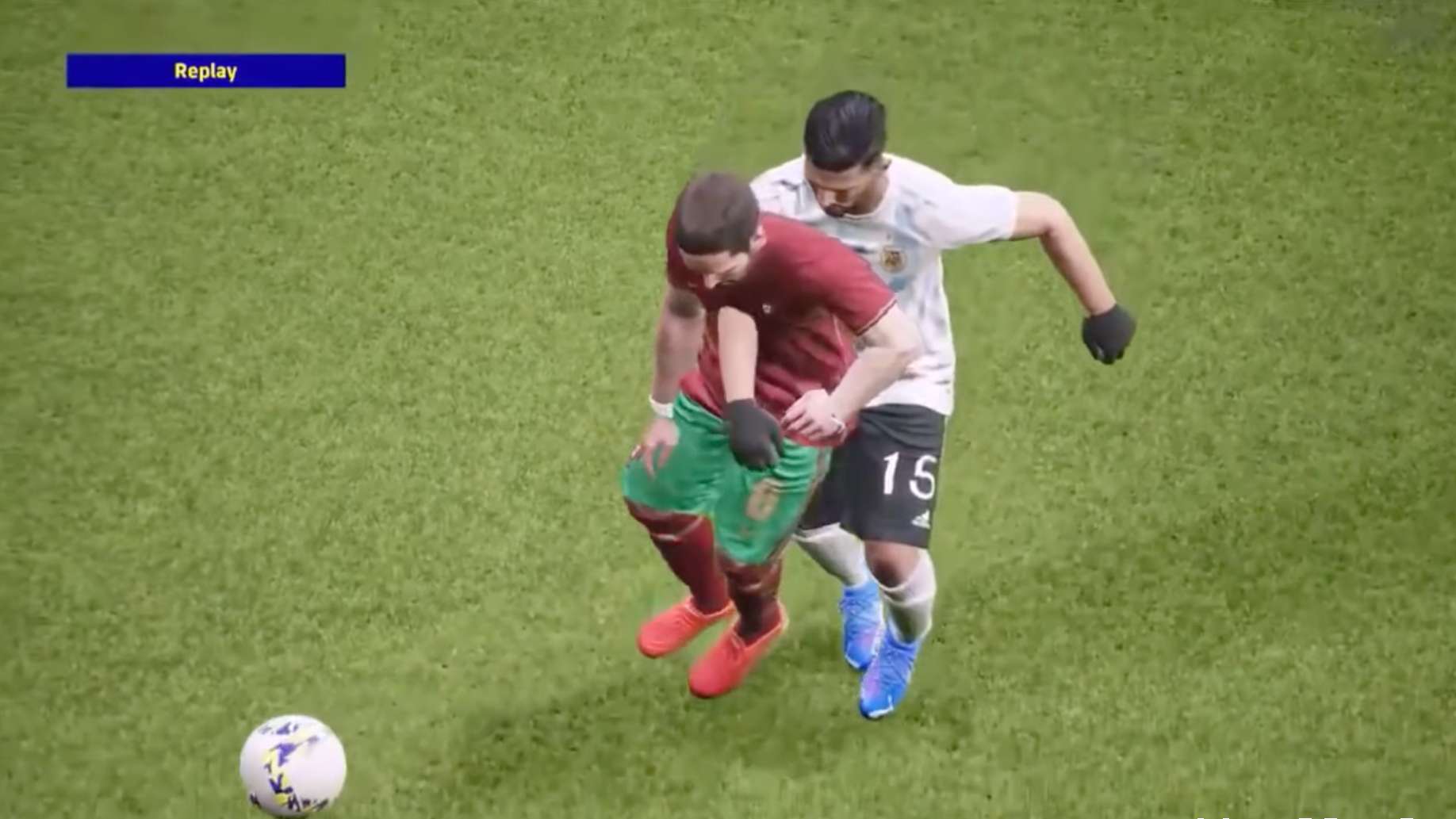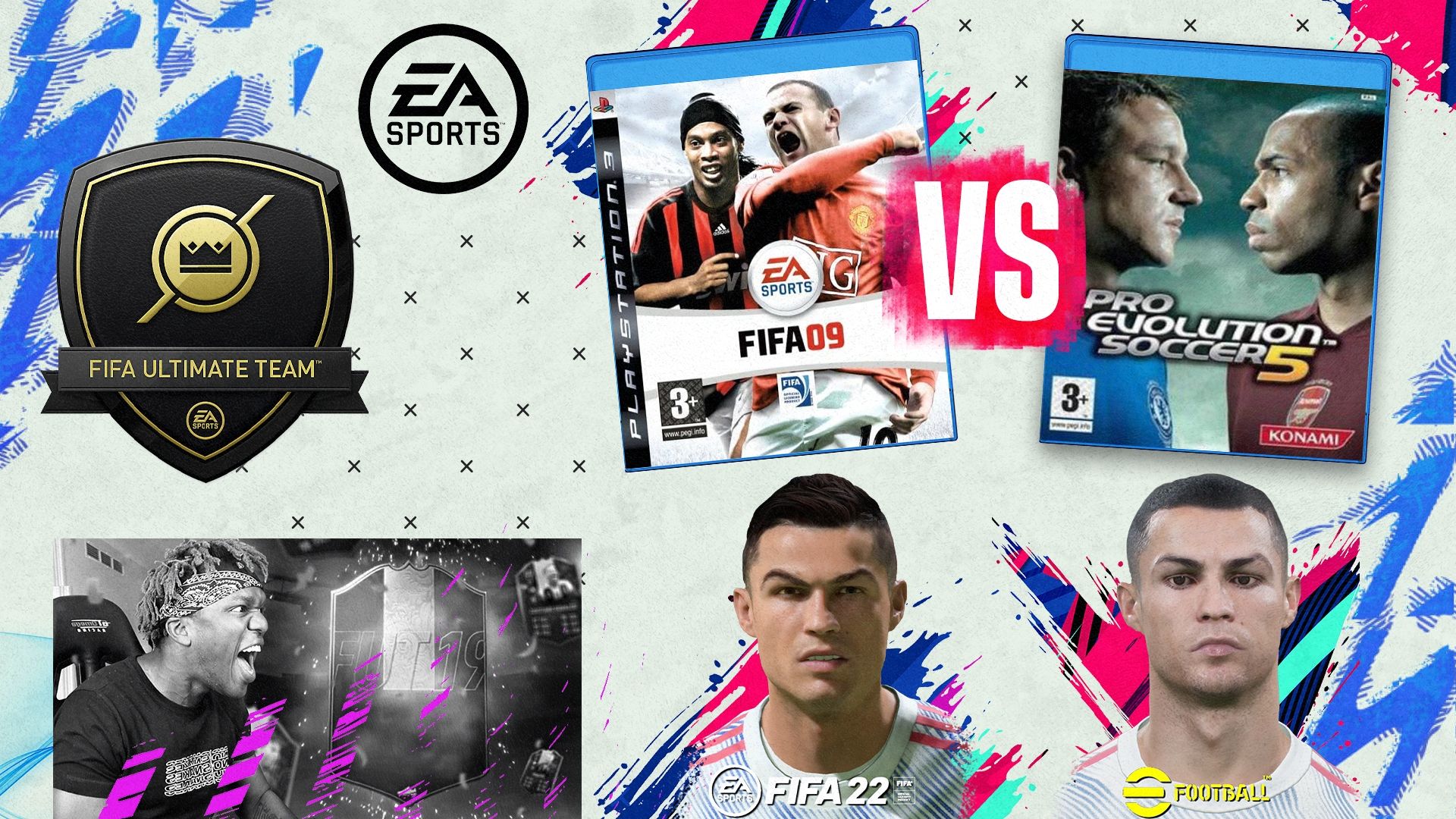At one point on a Saturday night in early December, while 25,000 people on the streaming platform Twitch simultaneously tuned in to watch people play FIFA 22, only 19 watched the competing game eFootball 2022.
The cultural gap between EA Sports’ FIFA franchise and Konami’s eFootball - a rebrand of its once dominant Pro Evolution Soccer title - has grown wider than ever this year, with eFootball 2022 players looking like zombies and game mode options a skeleton of past iterations.
Even Konami loyalists are having a difficult time justifying the use of their time on what is widely considered an incomplete game. For those faithful fans who have stuck around even as popularity waned since the mid-2000s glory years of PES, and who would like to keep supporting the game publisher, the recent setback has been particularly difficult to take.
“I feel like they sold us a lot of hope, and what we got was very disappointing,” YouTube video maker Bryan Bryezer told GOAL about how the end product of eFootball 2022 compares to its pre-launch hype. “So you know, it does feel like a slap in the face almost, because as a loyal PES fan you get the game every year.
"It's unbelievable, to be honest, a company with this much pedigree, releasing a game that's almost unplayable.”
PES was once widely considered the better football simulation due to advanced game play immersion for its time and expansive customisation features. It didn’t carry the licensing breadth of EA but that never mattered. Nuances, such as an AI system that realistically punished poor decision-making, existed in those games that are not even fully realised today.
But it’s been well over a decade since Konami outsold FIFA for a football game; in 2018, worldwide sales bottomed out at 550,000 copies compared to FIFA’s 12.2 million.
This year, Konami has offered eFootball for free in a gambit to bring back some of its lost market share. The glitch-laden release, however, has done little to help bolster its public image.
“We are very sorry for the problems, and want to assure everyone we will take all concerns seriously and strive to improve the current situation,” wrote Konami in a statement amid the instant backlash to eFootball 2022.
Konami has since promised a significant springtime update to its game, which is expected to bring back familiar game modes such as Master League and Become A Legend, as well as a new mobile launch. The company hopes these developments will begin to right the wrongs of eFootball 2022’s troubled release.
But can it realistically make the game acceptable for users in a short time given its recent missteps, not only regaining hardcore supporters but also adding new ones?
And even if the update improves matters significantly, would it be too late?
 Konami / GOAL
Konami / GOALTo understand the context of Konami’s stake in football, it helps to look back at the history of its rivalry with EA Sports and the importance of console generation transitions like the one the video game world is in now.
Let’s start with Konami at its peak delivering one of its finest titles at the end of the life cycle of the PlayStation 2, which it had already dominated to that point.
Maybe it’s just nostalgia talking, but many people will tell you the Japanese conglomerate offered one of the best, if not the best, football video game ever made in Pro Evolution Soccer 5 (also known as Winning Eleven 9) in August 2005.
“You were fully immersed in the drama,” said Marlon Anthony, a YouTube creator who has done extensive documentary work on the history of PES and FIFA. “I think it was magic. It was magic in a bottle.”
PES 5 received an 8.3 average user score on Metacritic; FIFA 06 came out the same year and received a 7.8.
Anthony picks PES 5 out above the rest having gone back and played football games as far back as the 90s in order to document their evolution. Compared to more recent games, he said, the competitive intensity needed to succeed is refreshing.
“The player is rewarded for their patience and your opponent punished for bad decision making as well,” he said. “Modern games try too much to make the player feel like they're [winning], and everything you want to do just happens for you, regardless of whether it could make sense for your players body shape, or for the team's positioning on the pitch.
“PES 5 was quite unforgiving in nature, you really had to work for your goals. And if you rushed a pass, or you rushed a shot, you understood why something failed. Whereas I think now regardless of the context, if the player requests to shoot, regardless of whether it makes sense, or whether it should be successful, nine times out of 10, it goes on target and is a goal. You kind of feel unfulfilled because you feel like you didn't even mean to shoot in that manner.”
Knowing they had a dynamite product, Konami was extremely confident in this era and willing to take risks. It even put a referee on the cover of a game, and included a mode where one could swap human players for penguins and dinosaurs.
“We could do anything at that point,” former Konami public relations chief Steve Merrett told The Guardian of the company’s confidence level during the PlayStation 2 era.
And for a while, they did.
 Getty / GOAL
Getty / GOALBut once the PlayStation 3 and Xbox 360 were released, ushering in an all-important next-gen transition period, EA Sports quickly took control of the playground.
Around this time, FIFA became increasingly important to EA as the company consolidated its sports video game titles. It lost rights to MLB after 2005 and gave up on college baseball in 2007. By 2011, Take-Two Interactive had obliterated EA in basketball with the soaring NBA 2K series leaving EA’s NBA Live franchise far behind. By 2014, production of its popular NCAA Football game had stopped amid legal challenges.
The desperation to succeed in football, then, led to an era of inventiveness and quick progress.
FIFA 09 was not only arguably the most important title in modern football video game history, but also arguably the most consequential in modern sports game history, period. That’s because it introduced FIFA Ultimate Team - the build-your-fantasy-squad game mode featuring shiny virtual cards representing players usable in actual matches.
The game mode, as addictive as anything one will find in the sports gaming genre, is now a staple of other EA sports franchises as well as NBA 2K and San Diego Studios’ MLB The Show.
“Obviously that was the big turning point where it was like, OK, it used to be about how the game played and how it looked and all this kind of stuff, and now it's about the fact that FIFA has Ultimate Team,” said game reviewer Jordan Oloman. “Ultimate Team is the massive golden goose that is making all the money. And as you know, if you're a teenager, like I was when Ultimate Team first came out, it was the biggest thing ever.
“It's that cult of Ultimate Team that makes everyone play FIFA over PES.”
Indeed, the gameplay itself in FIFA 09 wasn’t perfect, with online users quickly figuring out that goalkeepers could be chipped rather easily from any outside-the-box angle, including straight from kick-off. However, the implementation of new features such as Ultimate Team, as well as improvements to Career Mode, helped draw interest and laid the groundwork for total domination throughout the 2010s.
EA Sports had hit its stride - and it didn't need to pay as much attention to the rival slipping behind it.
“After FIFA 08 we didn’t really look towards PES,” acknowledged former FIFA lead designer Gary Paterson to The Guardian. “We had so much we wanted to do. We spoke a lot about the shooting system, a more sophisticated version of what we’d created on PS2. The designers would talk about how the challenge is not to pass the ball once, but 15 times in order to create space for a shot.”
Just as Konami had honed its product to near-perfection late in the PS2 lifecycle, EA Sports used the momentum of FIFA 09 to create games that pushed the outer limits of what was possible on the PlayStation 3 and Xbox 360.
Starting around 2010 FIFA World Cup South Africa, EA began to unlock its vision of 360-degree player dribbling and passing control, eventually culminating in full freedom of movement that was desperately needed in football video games.
PES would gain similar capabilities soon after, but it’s inconsistency from year to year during this period meant it could not offset the gains made by its rivals across the board.
“Each game didn't just simply get better than the previous one, we'd have one game that would come along, and it would be, you know, somewhat, not industry changing, but it would be very, very influential, and it will be critically revered,” Anthony said. “And then the very next game would regress in so many ways.”
To worsen matters for Konami, its inability to tap into the exploding cultural genre of YouTube and game streaming meant a disproportionate number of influencers were giving massive amounts of free publicity to FIFA.
Videos of Ultimate Team pack openings that included live reactions garnered millions of views for accounts such as KSI, who now has more than 23 million YouTube subscribers having since branched into more mainstream cultural subject matter.
In the years since, EA has made it a point to partner not only with YouTube stars but also with musicians and internationally famous athletes of other sports to help promote games.
”That [influencer culture] has obviously driven popularity to the maximum, to the point where now in FIFA 22, influencers and football stars were prioritised in the run-up to the game,” Oloman said. “That influencer boom, YouTube boom, all kind of came around at the same time and a lot of influencers that are now more lifestyle brands like KSI and have music albums … but they rode up on this big wave of FIFA Ultimate Team.”
It was enough of a perfect storm for EA that the next-gen transition in 2013 from the PS3 and Xbox 360 to the PS4 and Xbox One came and went without significant inroads from Konami.
The gap in sales in 2009 was just 1.8 million copies; by 2018 it was more than 12 million.
In retreat for more than a decade and having failed to capitalise on the previous console transition, eFootball 2022 on the PlayStation 5 and Xbox Series X/S marked an opportunity for Konami to use a console transition to fuel the start of a comeback.
After all, EA has itself been accused of over-reliance on the Ultimate Team formula that brought popularity and profits in abundance when it first emerged.
Aspects of the pack opening system, Oloman said, are predatory, with users drawn to loot boxes with low chances of acquiring desirable cards.
An EA official disputed that notion, however, telling GOAL: “Spending is entirely optional in our game. Players can open FUT packs by earning rewards through gameplay and that’s how most choose to do it - more than three quarters of FIFA 21 players didn't spend in game, and nine out of 10 FUT packs opened in FIFA 21 were earned rather than purchased. “Ultimately, it is a game of skill and we spend tremendous amounts of time and resources to ensure that long-term success in-game is determined by gameplay.
“We wholeheartedly believe that Ultimate Team and FUT Packs, which have been part of the game for more than a decade, are a part of FIFA that players love and we will continue to listen to our community and invest in the game to make it better for everyone.”
Not only has Konami not created a viable alternative to EA’s model this year, pouncing on the criticism levied on its counterpart, but its springtime game update pending, the company has fallen further behind amid a period that has historically been of vital importance.
 eFootball 2022
eFootball 2022As Konami starts the latest next-gen cycle wrong-footed, EA Sports intends to capitalise with a fast-moving business approach.
“When we kind of interact with our hundreds of millions of football fans, they tell us they want more cultural brand involvement from across the globe,” CEO Andrew Wilson said on a recent earnings call. “They want more [experiences] inside the game, which go beyond just straight 11-on-11 football. They want more digital experiences outside the game, esports, NFTs, broader sports consumption and they want us to move really, really quickly.”
It remains to be seen, of course, whether that promise to continue improving the product rather than becoming complacent will actually come true. And while EA Sports has for all of its criticism been the more revolutionary company since the PlayStation 3 came out, Konami has had its brilliant moments as well, albeit mostly longer ago than its rival.
A return to top form from Konami, as unlikely as it might seem right now in the wake of eFootball 22, would hardly be met by silence.
Take Dylan Yo, for example, a self-described football gaming fanatic with an affinity for retro titles born from a childhood spent with Nintendo World Cup, two controllers and his brother, who in adulthood still gives crooked thumbs ups to reference the mangled way his hand would look after long basement sessions pressing the sprint trigger.
The New Mexico, United States, native has long been a member of the FIFA clan and currently sees little reason to leave. But that doesn’t mean he wouldn’t. Football video games, after all, can transcend the strict tribalism of the sport they simulate.
“Honestly, I'd be willing to one day make the switch [to PES],” he said. “I mean, I'm not honorbound. If there's a better game that comes out, and it's soccer related, I’d try to play it because I'm more about having fun. You know, my days of super competitiveness are over. I just want to have a good time.”
For many, the co-existence of FIFA and a Konami title, be it PES or eFootball, creates a competitive marketplace that can only make things more enjoyable for the consumer.
After all, the duel between studios has at times bred innovation that has influenced all sports games.
“They are both essential to each other, even though many people now would probably consider there isn't really a rivalry anymore,” Anthony, the documentary creator, said. “I still think it's important for them to both exist, I wouldn't want to see either of them go out of business, even though Konami has suffered really badly with the disastrous launch of eFootball. There’s still time for them to turn around and come back into this..”
“A harsh lesson has to be learned from the people who made the decision to release the game in the state that it did. … The humiliation was needed.”
.jpg?auto=webp&format=pjpg&width=3840&quality=60)